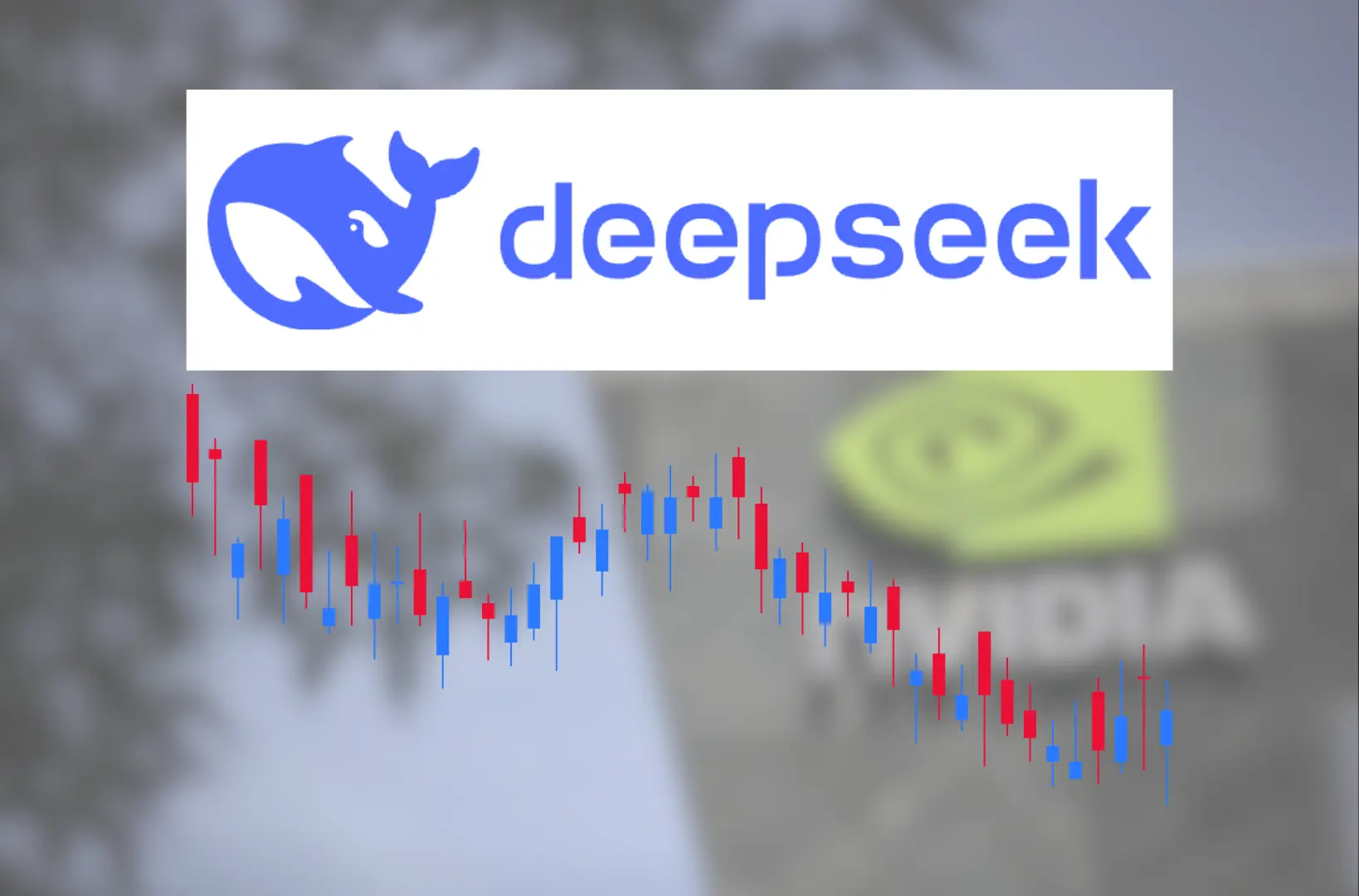The world of technology and artificial intelligence (AI) is known for its rapid pace, groundbreaking innovations, and intense competition. However, few events have shaken the industry as profoundly as the recent stock market turmoil surrounding Nvidia. On January 27, 2025, Nvidia’s shares fell by a staggering 17%, marking the largest single-day loss in U.S. stock market history. The reason? A disruptive Chinese AI startup named DeepSeek, whose innovative approach has sent shockwaves through the tech industry and spooked investors worldwide.
This blog dives deep into the factors behind it’s stock dip, the implications of DeepSeek’s emergence, and what this means for the broader AI market.
A Historic Decline: Nvidia’s Stock Performance
A powerhouse in GPU production and AI hardware, has seen its stock soar over the past few years due to its pivotal role in the AI revolution. From powering generative AI models like OpenAI’s ChatGPT to supporting breakthroughs in machine learning, Nvidia has been at the forefront of the AI boom. However, the company’s shares took a massive hit on January 27, 2025, wiping out approximately $593 billion in market capitalization.
This sell-off wasn’t limited to Nvidia. Other major tech companies, including Microsoft, Alphabet (Google’s parent company), Broadcom, and Marvell Technology, also saw significant declines, contributing to a $1 trillion loss across the Nasdaq Composite Index. Nvidia’s dip, however, stood out as it signaled deeper concerns about the competitive dynamics in the AI market.
The Catalyst: DeepSeek’s Disruptive Innovation
DeepSeek, a Chinese AI startup that launched in late 2024, has captured global attention with its groundbreaking AI application. The application, developed with a modest investment of just $6 million, has already surpassed U.S.-based ChatGPT in downloads on the Apple App Store. What’s even more surprising is that DeepSeek achieved this without relying on Nvidia’s high-performance GPUs, raising questions about the future demand for Nvidia’s products.
DeepSeek’s AI assistant is reported to offer similar or superior capabilities to its Western counterparts, but at a fraction of the operational cost. This has raised alarms among investors and industry analysts, who fear that such innovations could undermine the dominance of established players like Nvidia.
Why DeepSeek’s Innovation Spooks Investors
The rapid success of DeepSeek’s AI app highlights several key trends and challenges that could reshape the AI landscape:
- Cost Efficiency:
DeepSeek’s ability to create a competitive AI product without Nvidia’s GPUs underscores the potential for more cost-effective solutions. This challenges Nvidia’s reliance on premium hardware as a primary revenue driver. - Geopolitical Implications:
U.S.-China tensions have already created hurdles for companies like Nvidia, with export restrictions on high-performance chips limiting their ability to operate freely in the Chinese market. DeepSeek’s emergence adds another layer of complexity, as it signals China’s growing self-sufficiency in AI. - Investor Confidence:
Nvidia’s stock has been buoyed by its perceived technological leadership and growth potential. However, the rise of competitors like DeepSeek raises doubts about the sustainability of this narrative, leading to increased market volatility.
The Ripple Effects on the Tech Sector
DeepSeek’s rise has not only impacted Nvidia but has also triggered a broader reassessment of valuations in the tech industry. Companies heavily invested in AI and machine learning are now facing heightened scrutiny from investors, who are questioning whether their growth projections are realistic in the face of emerging competition.
For instance:
- Microsoft and Alphabet: Both companies are significant players in generative AI and cloud computing. The success of a low-cost competitor like DeepSeek could force them to rethink their strategies and pricing models.
- Broadcom and Marvell Technology: These semiconductor companies are closely tied to the AI hardware supply chain. Any disruption in demand for premium chips could have cascading effects on their revenues.
Opportunities Amid the Chaos
While the emergence of DeepSeek has rattled markets, it also presents opportunities for companies to innovate and adapt. Here are some strategies Nvidia and its competitors might consider:
- Strengthening R&D Investments:
Nvidia’s ability to innovate has been a cornerstone of its success. Doubling down on research and development could help the company stay ahead of competitors like DeepSeek and maintain its leadership in AI hardware and software. - Diversifying Revenue Streams:
By expanding into new markets and developing cost-effective solutions, Nvidia can reduce its reliance on high-end GPUs and tap into emerging customer segments. - Building Strategic Partnerships:
Collaborating with global tech leaders and startups could open new revenue streams and foster innovation. For example, partnering with developers of AI applications could help Nvidia maintain its relevance in the AI ecosystem. - Enhancing Market Intelligence:
Investing in market research to better understand emerging trends and customer needs could give Nvidia a competitive edge. This includes anticipating potential disruptions and proactively addressing them.
Lessons for Investors
For investors, Nvidia’s recent stock dip is a reminder of the volatility inherent in the tech sector, particularly in fast-evolving fields like AI. While short-term market reactions are inevitable, it’s essential to focus on long-term fundamentals and growth potential.
- Stay Informed: Keeping an eye on emerging competitors and industry trends is crucial for making informed investment decisions.
- Diversify Portfolios: Avoid overexposure to a single company or sector to mitigate risks associated with market fluctuations.
- Focus on Fundamentals: Companies with strong financials, robust R&D pipelines, and proven adaptability are more likely to weather competitive challenges.
The Bigger Picture: AI’s Global Evolution
DeepSeek’s emergence highlights a broader trend: the democratization of AI. As new players enter the market and develop innovative solutions, the industry is becoming more accessible and competitive. While this poses challenges for established companies like Nvidia, it also accelerates the pace of innovation, benefiting consumers and businesses alike.
For Nvidia, the road ahead will require strategic agility and a renewed focus on customer needs. By embracing change and doubling down on innovation, the company can turn this setback into an opportunity for growth.
Conclusion: Nvidia’s Resilience in the Face of Disruption
The recent decline in Nvidia’s shares marks a pivotal moment in the company’s history. While the rise of DeepSeek has raised valid concerns, it also underscores the dynamic nature of the AI industry. Nvidia’s track record of innovation and adaptability suggests that it is well-positioned to navigate these challenges and continue shaping the future of technology.
For now, the spotlight remains on Nvidia’s next moves and how it responds to the competitive pressures introduced by DeepSeek. As the AI revolution unfolds, one thing is certain: the industry’s future will be defined by those who can adapt and innovate in an ever-changing landscape.
Suggested reads:
- What can your business learn from moveit hack
- Nvidia’s $249 Dev Kit Promises Affordable, Small-Scale AI Power

Jahanzaib is a Content Contributor at Technado, specializing in cybersecurity. With expertise in identifying vulnerabilities and developing robust solutions, he delivers valuable insights into securing the digital landscape.








